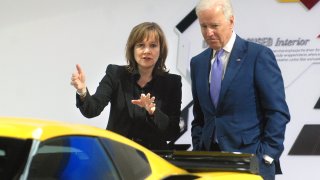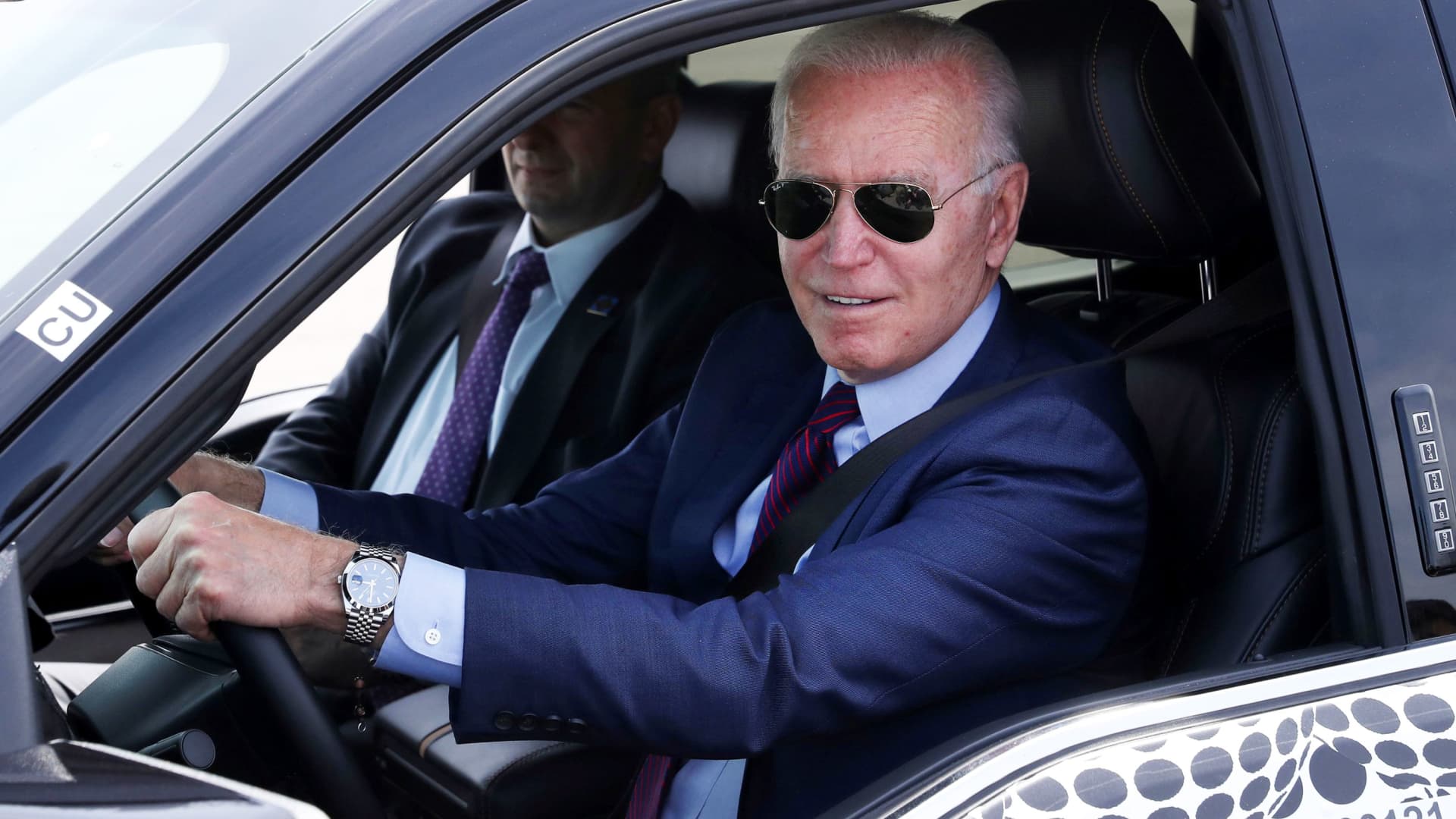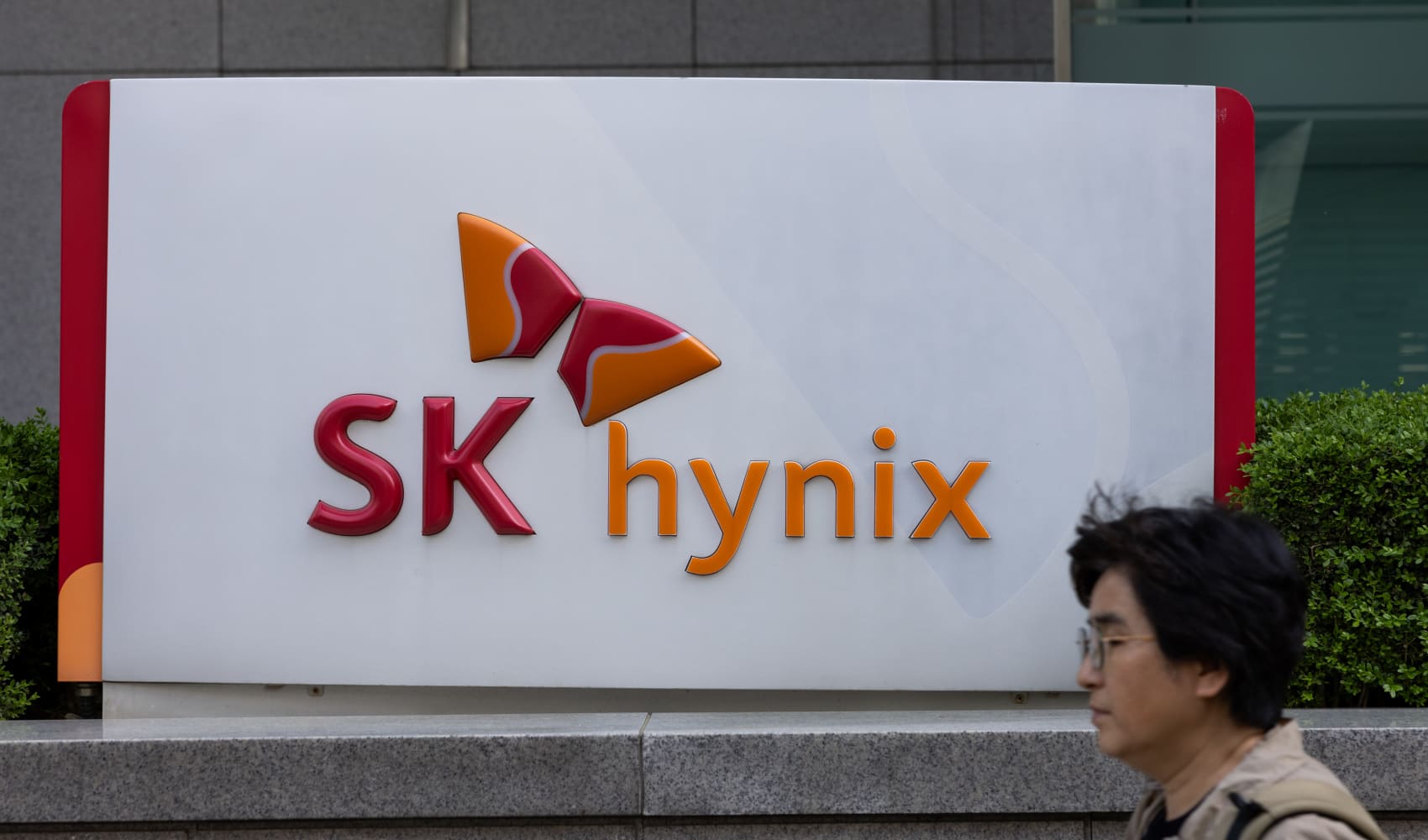
- President Joe Biden will announce a new national target for electric vehicles to make up half of all new vehicle sales by 2030.
- The Biden administration also is expected to announce proposed federal fuel economy standards through the 2026 model-year Thursday that build on California's tougher regulations.
- "We have got to act, the transportation sector is the biggest part of our economy emitting greenhouse gases, and cars and trucks are one of the biggest parts of that," Transportation Secretary Pete Buttigieg told CNBC.
President Joe Biden will set a new national target on Thursday for the adoption of electric vehicles, calling for them to represent half of all new auto sales by 2030, according to senior administration officials.
The target is expected to be supported by companies such as General Motors, Ford Motor and Stellantis, formerly Fiat Chrysler. Executives of the Detroit automakers are scheduled to attend an event Thursday at the White House and pledge EV sales of between 40% and 50% by 2030.
Though the president will sign an executive order, the sales target is not mandatory. Instead, the document encourages the U.S. auto industry and government to promote legislation and the adoption of electrified vehicles. The target includes zero-emission vehicles powered by fuel cells and batteries as well as plug-in hybrid models with internal combustion engines.
We're making it easier for you to find stories that matter with our new newsletter — The 4Front. Sign up here and get news that is important for you to your inbox.
The order "doesn't function as a mandate, but it does create the conditions for us to meet that goal," Transportation Secretary Pete Buttigieg told CNBC's "Squawk Box" on Thursday. "We have got to act, the transportation sector is the biggest part of our economy emitting greenhouse gases, and cars and trucks are one of the biggest parts of that."
The Biden administration also is expected to announce proposed federal fuel economy and emission standards through the 2026 model-year that build on California's tougher regulations, the officials said. The proposed standards are subject to a public comment period and final approval.
Money Report
While automakers have increasingly been supportive of EVs, they've been mixed on near-term fuel economy standards as they attempt to rake in profits from traditional vehicles to fund electric models. EVs have historically been unprofitable or produce lower profit margins.
It's unclear how many automakers will support Biden's fuel economy standards. Automakers such as Ford, Honda Motor and Volkswagen previously agreed to California's tougher standards, which the Trump administration adamantly opposed.
Some smaller brands such as Volvo plan to go all-electric by 2030, while Stellantis and Ford have announced goals for at least 40% EVs by then. GM earlier this year announced an "aspiration" to exclusively offer all-electric and fuel-cell vehicles by 2035.
Such rapid adoption of EVs faces significant hurdles, such as charging infrastructure, consumer adoption and vehicle costs.
"Today, Ford, GM and Stellantis announce their shared aspiration to achieve sales of 40-50% of annual U.S. volumes of electric vehicles (battery electric, fuel cell and plug-in hybrid vehicles) by 2030 in order to move the nation closer to a zero-emissions future consistent with Paris climate goals," the automakers said in a joint statement. "We look forward to working with the Biden Administration, Congress and state and local governments to enact policies that will enable these ambitious objectives."
Jessica Caldwell, executive director of insights at auto insights firm Edmunds, said the EV sales goal isn't "particularly over ambitious" but it will ultimately depend on regulations and consumer adoption, which remains low.
"Automakers are all making aggressive plays in this category," Caldwell said. "However, what we've seen over the past five years or so is these targets tend to be moving targets, not solid targets. All of it is more fluid than actual plan."
A previous goal of the Obama administration to sell 1 million EVs from 2012-2015 fell far short of expectations. In January 2016, Reuters reported only about 400,000 electric cars had been sold.
The U.S. is the world's third-largest market for EVs. While total new car sales were down by 23% in 2020 to about 14.6 million units, sales of all-electric vehicles fell by 11% to 295,000 units, according to IHS Markit.
Senior Biden administration officials touted the adoption of EVs and executive order as a job stimulator for American manufacturing. They said the new actions will support Biden's "Build Back Better Agenda" and the bipartisan infrastructure deal.
Officials with the United Auto Workers, which represents hourly union workers at the Detroit automakers, have not been so convinced of EVs spurring American jobs.
"While the UAW notes that the companies have made voluntary commitments on Electric Vehicles, the UAW focus is not on hard deadlines or percentages, but on preserving the wages and benefits that have been the heart and soul of the American middle class," UAW President Ray Curry said in a statement Wednesday.
A 2018 study by the union found that mass adoption of EVs could cost the UAW 35,000 jobs, but officials have said that number could be lower now. EVs require far fewer parts than those with internal combustion engines, which means potentially fewer factory assembly jobs. A lot of the parts for EVs are made outside the U.S. or at domestic plants where workers are paid far lower wages than traditional assembly jobs.
In May, IHS Markit forecast U.S. all-electric sales to be 25% to 30% of new vehicles in 2030 and 45% to 50% by 2035.

Correction: A previous version misstated Pete Buttigieg's title.






